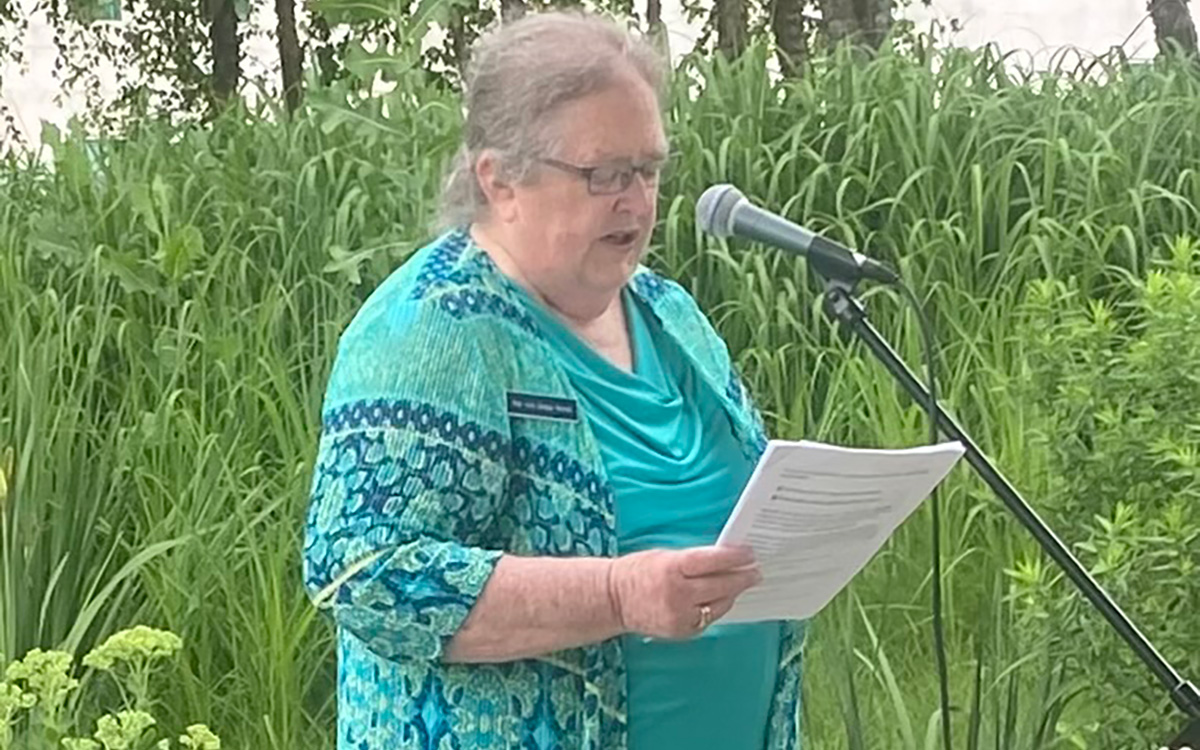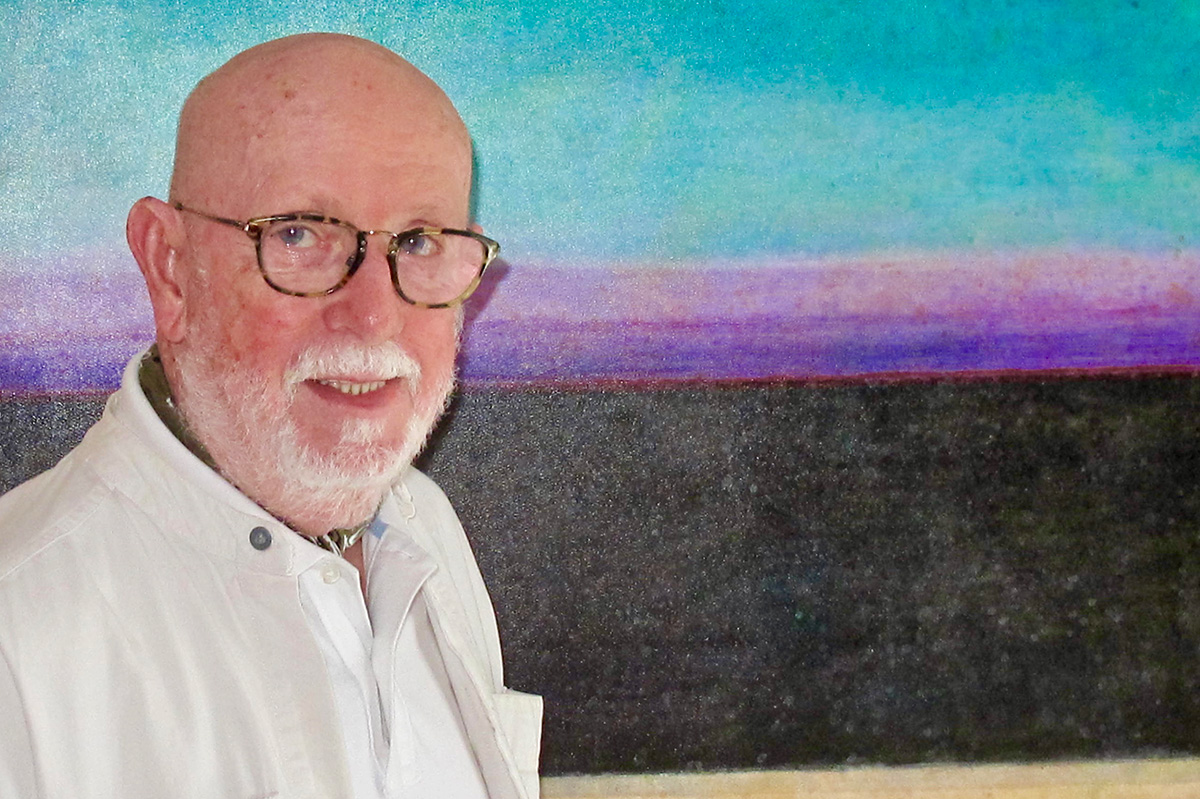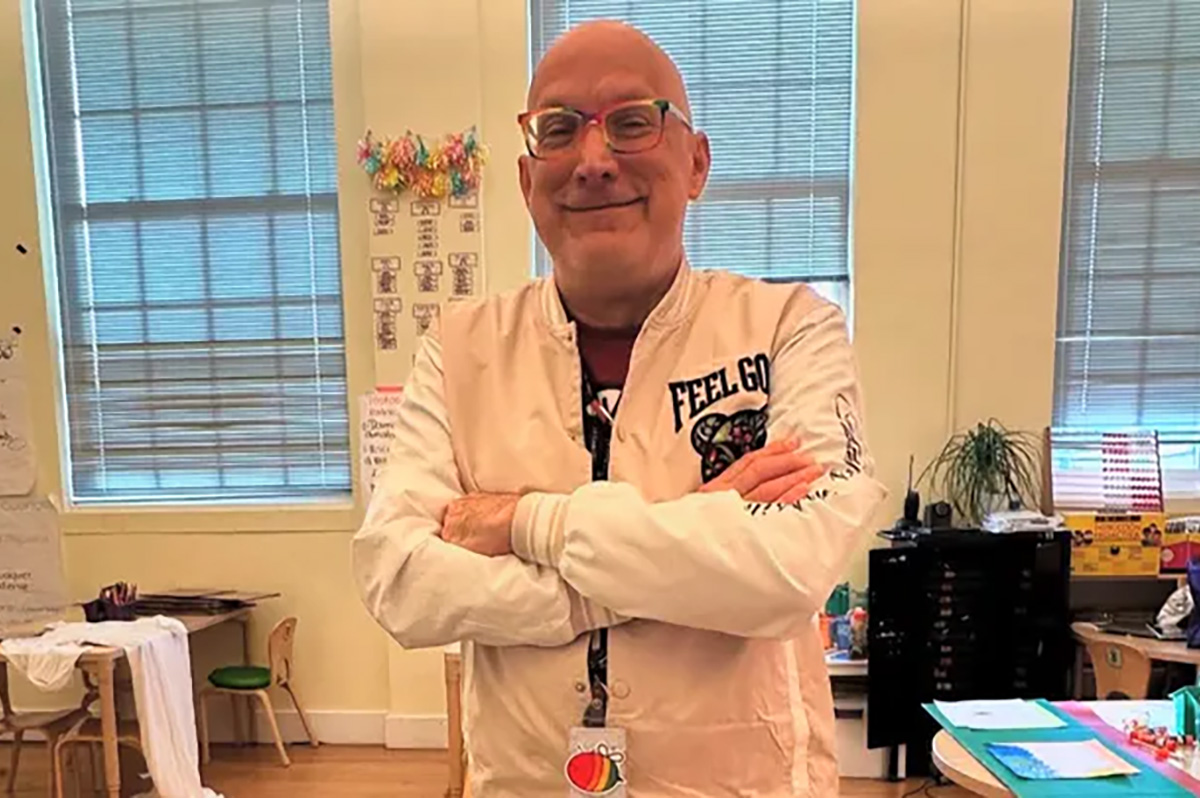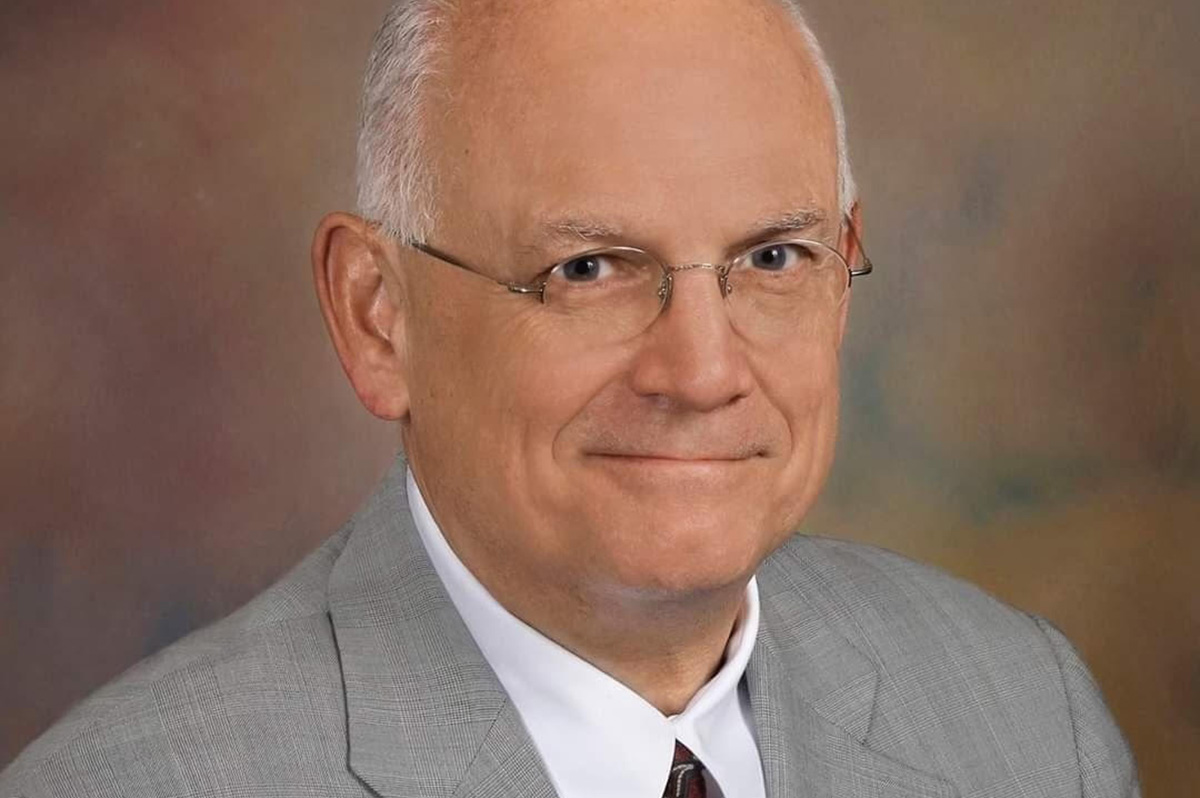Obituary
Trailblazing Maine lawmaker Lois Galgay Reckitt dies at 78
State representative co-founded HRC Fund, fought for domestic violence survivors

After spending many happy summers at Goose Rocks Beach in Maine, Lois Galgay told her mother when she was 7 that she wanted to move to Maine. Her mother suggested she wait until she grew up.
She waited, but she did end up in Maine in her 20s and became the fiercest advocate for woman and children the state has ever seen, her decades-long advocacy ending only with her death from cancer Oct. 30, 2023, at the age of 78. Maine recognized her achievements by inducting her into the Maine Women’s Hall of Fame and the Deborah Morton Society, and by giving her awards for her seminal work on domestic violence. The judicial system, the state bar association and the police chiefs’ association all honored her.
But she also was a leader on the national stage. The headline in Ms. Magazine after her death read: “Rest in Power: Lois Galgay Reckitt, Trailblazing Feminist Activist.”
Eleanor Smeal, an activist since the 1970s who was once called one of the most influential women in America, wrote these words in the magazine: “Lois Reckitt has not only been an inspirational leader for women and girls in Maine, but also nationwide. Lois was a champion for the Equal Rights Amendment both for the United States Constitution and the Maine Constitution. She was a leader in the National Organization for Women and a national leader in the fight to end violence against women and girls. I had the good fortune to work with her closely when I was president of the National Organization for Women, and she was the executive vice president. She worked for women’s rights until the time of her death and was very proud that she had just passed historic legislation in Maine to end sex trafficking.”
Reckitt was on NOW’s national board for 15 years and from 1984 to 1988 was executive vice president. She was elected to the position, and pursued the work with a vengeance, working 60 to 70 hours a week. She also served for eight years on the national board of the Human Rights Campaign Fund, a political action group she cofounded and replicated in Maine. She was a member of the National Coalition to End Domestic Violence for many years.
She is listed in “Feminists Who changed America ’63-’75.”
Reckitt grew up in Massachusetts, an only child and the daughter of parents who both were polio survivors. She came to Maine by following her husband, who was stationed in the Coast Guard in South Portland. She said she had no clue she was a lesbian at that time. That truth came to her during two marriages, and in due time she came out and became a champion for gay rights.
She was preceded in death by her father, George A. Galway of Winthrop, Mass., and her mother, Marjorie Lewis Wright of South Portland.
She is survived by Lyn Kjenstad Carter, her loving partner/wife of 20 years; stepdaughter, Barbara M. Carter-Eide, son-in-law, Pala Carter-Eide, stepdaughter, Crystal L. Hartford; five grandchildren; and many cousins in the Galway and Wright families.
She was not only a national leader on domestic violence — she was a true leader in Maine. She founded Family Crisis Shelter, which became Family Crisis Services, now Through These Doors, and headed it for more than three decades, taking time out for her work in Washington, D.C. When she returned to Maine, she was exhausted and said she would do nothing but sleep for six months. But she resumed her work, heading an agency with a $1.4 million budget, a staff of 30, three outreach offices and a battered women’s shelter. At the forefront of efforts to stop domestic abuse and help its victims, she lobbied for stronger laws and more aggressive enforcement of them. She raised public awareness of the magnitude of domestic abuse while lobbying successfully for anti-stalking legislation, a domestic violence homicide review panel and gun control measures for abusers.
She worked not just to pass laws but to help police, prosecutors and judges better understand domestic violence and the harm it caused. “Her approach rested on her belief that people want to do what is right and just, and that most people will respond better to a victim’s needs if that person has knowledge of the dynamics of domestic violence,” said retired Judge Michael Cantara, a longtime friend.
Reckitt led many groups, but sometimes had to create them first. Maine’s NOW chapter, the Maine Right to Choose, the Maine Coalition for Human Rights and the Matlovich Society for Gay Rights and AIDS Awareness were among the organizations that were created, in whole or in part, by her. Forty-five years ago, she and eight others, including now-Gov. Janet Mills, founded the Maine Women’s Lobby. Destia Hohman Sprague, current Women’s Lobby executive director, said Reckitt “set such a profound example of what it is like to work on an issue, to follow your heart and to work on an issue in every possible way. She never gave up working as an activist and then a policy maker, and I just admire that so much.”
State leaders lauded her on her passing, calling her a trailblazer, a feminist icon, a hero, a modern pioneer and “a truly remarkable person.”
“Lois never stopped trying to make our state better for everyone,” said Mills, who went to her home to swear her in for her last legislative term. “She was a dear friend, and I will miss her deeply.”
Reckitt knew her work would take endurance, a requirement that may have tested her mettle, but she never gave up. She introduced an Equal Rights Amendment in the Maine Legislature three times and was rebuffed every time. She helped create the coalition that put forward the first gay rights bill in Maine. She and other activists thought it would take 10 years to pass a law. It took 25. She could find only two sponsors. One was Gerald Talbot, the first black man elected to the Maine Legislature. To learn more about gay rights, Talbot went a bookstore to get a book. “They wouldn’t take the money out of his hand because they thought he was gay,” Reckitt recalled. The incident showed the difficulty they were up against. Reckitt provided the lead testimony on the bill, but even though no one spoke against it, it failed.
She came out at this time, but minimally. She decided to stay closeted until the first campaign was over and came out afterwards at the farmhouse of a straight friend in Newcastle. Gay rights were in her playbook from that moment on. Working with a gay man who was dying of AIDS, she founded a group that provided a safe space for gays and lesbians to gather, a way of lessening their isolation. It began with six or seven people and soon mushroomed to be as many as 150, some driving hours to get there. She would be a pallbearer at the man’s funeral.
Despite the intensity of her work to fix things that were broken, she wasn’t a rabble rouser — she tended to work behind the scenes — but she was arrested twice, once while protesting apartheid at the South African embassy in Washington. She jumped into the national fray again when the national gay rights movement went to Washington to protest Reagan’s inadequate response to the AIDS crisis. In an oral history interview, she was clearly dismayed that Reagan had never spoken the word AIDS. “Reagan was such a ditz,” she said.
Outside the White House, she protested in the prosaic way it was done in those days: sitting down and refusing to move. Sixty-seven people were arrested. She was the first, “not because I was particularly outrageous or anything” but because of the way the protest was set up, she said in her oral history interview. She claimed to have “the odd distinction of being the first women in the U.S. arrested by police using those Playtex rubber gloves,” which they used to “reach down my pants to see if I was carrying who knows what.”
She had widespread interests, including her Irish ancestry. She knitted, quilted and did needlepoint, traveled extensively, taught swimming and biology, played basketball in college. Most importantly, she loved the Boston Red Sox and Celtics.
In seeming contradiction to her life’s work, she received college degrees from Brandeis University in biology and from Boston University in marine biology and biological oceanography. But she said her scientific education taught her how to approach things in life.
“She loved the sea, and she loved that she lived only steps from the beach,” said longtime friend Lee Umphrey. “She liked to say her legislative district was on the ocean side of South Portland.”
She once said the three loves of her life were the women’s rights movement, the lesbian rights movement and the movement to end violence women. “I have lived an interesting life,” she said.
“Lois came of age when the civil rights movement, the environmental protection movement, the anti-Vietnam movement, the anti-apartheid movement, and the equality for women movement were front and center,” said Cantara, the retired judge. “She chose to become a lifelong engaged citizen who advocated for the poor, the marginalized, the forgotten, the dismissed. She took her legislative duties very seriously. She was working on legislative matters up to two days before she died.”
She even participated in a national conference from her hospital bed, one that focused on her pioneering Maine work to end sexual exploitation. In appreciation, the National Center on Sexual Exploitation gave her the Dignity Defense Award. “To the very end, Lois was in the saddle championing equality,” Umphrey said. “She gave it her all until the end.”
But in her 1999 oral history interview, she wondered what her life would add up to. “One of the things I’ve been concerned about my life is to not have my life disappear,” she said. “I figure somebody will remember sometime that I set foot on the planet. I’ve done a lot of good stuff. I know that, and I figure I’m only half done.”
A celebration of her life took place on Nov. 12, at the Maine Irish Heritage Center in Portland. Reckitt had been on the center’s board and its treasurer.
In lieu of flowers, donations are suggested to:
Through These Doors at
737-234-6464; OR
The Maine Irish Heritage Center,
34 Gray St.,
Portland, Maine, 04112-7588
207-780-0118
Obituary
Longtime DC resident Thomas Walsh dies at 87
Pa. native’s husband was by his side when he passed away

Long-time D.C. resident Thomas Walsh died on May 16. He was 87.
Walsh was born on Sept. 17, 1937, in Scranton, Pa. His family later moved to Levittown, Pa.
Walsh met his husband, Anthony Carcaldi, at the Blue Note, a gay bar in Asbury Park, N.J., in 1964.
“I walked in the bar with friends from New York City,” recalled Carcaldi. “I looked at the piano and this person was singing … and all I noticed were his blue eyes.”
Walsh was singing “Because of You.”
“I walked up to the piano while Tom was singing and stared at him, which caused him to forget the words,” said Carcaldi. “He composed himself and started from the beginning.”
Carcaldi and Walsh became a couple in 1965, a year after they met, when they moved to Philadelphia.
“We moved in together and have been together ever since,” said Carcaldi.
Walsh was a freelance graphic designer until he accepted a job in Temple University’s audiovisual department. Walsh and Carcaldi moved to D.C. in 1980.
Walsh began a graphic design business and counted Booz Allen as among his clients. Carcaldi said one of his husband’s “main loves was painting,” and became a fine artist in 2005.
Walsh showed his art at the Nevin Kelly Gallery on U Street, the Martha Spak Studio near the Wharf, and at the Wexler Gallery in Philadelphia. Walsh also sang with the Gay Men’s Chorus of Washington.
Walsh and Carcaldi married at D.C. City Hall in 2014.
“Tom and I have been together since 1964 until his death,” said Carcaldi. “Tom died peacefully with me at his side in bed on May 16, 2025, holding Tom in my arms as he made the transition out of life.”
A celebration of life will take place in September.
Obituary
Beloved schoolteacher, D.C. resident Patrick Shaw dies at 60
Colleagues, friends say he ‘touched so many lives’ with warmth, kindness

Patrick Dewayne Shaw, a highly acclaimed elementary school teacher who taught and served as vice principal in several D.C. schools since moving to the District in 2002, died April 19 at the age of 60.
His friend Dusty Martinez said his passing was unexpected and caused by a heart related ailment.
“Patrick touched so many lives with his warmth, humor, kindness, and unmistakable spark,” Martinez said in a statement. “He was a truly special soul – funny, vibrant, sassy, and full of life, and we are heartbroken by his loss,” Martinez wrote.
Among those reflecting on Shaw’s skills as an educator were his colleagues at D.C.’s Mundo Verde Bilingual Public Charter School, where he served as a second-grade special education teacher since August 2023.
“Patrick brought warmth, joy, and deep commitment to Mundo Verde,” his colleagues said in an Instagram posting. “His daily Broadway sing-alongs, vibrant outfits, and genuine love for his students filled our community with energy and laughter,” the posting says.
Biographical information provided by Martinez and Karen Rivera Geating, a senior inclusion manager at the Mundo Verde school and Shaw’s supervisor, shows Shaw had a distinguished 38-year teaching career and multiple degrees in the field of education.
He was born and raised in Little Rock, Ark., and graduated from Little Rock’s Catholic High School for Boys.
He received two bachelor’s degrees, one in philosophy from St. Meinrad Seminary College in Indiana and one in elementary education from the University of Minnesota in St. Paul.
The biographical information shows Shaw received three master’s degrees. One is in secondary education and history from the University of Arkansas at Little Rock. His second master’s degree is in special education from The Catholic University of Washington, D.C. His third master’s degree is in school administration from Trinity College in D.C.
Shaw began his teaching career in 1987 in Little Rock, Ark., as a fourth grade General Education Teacher at Our Lady of Good Counsel School and a short time later at Little Rock’s St. Theresa Catholic School as a fourth-eighth grade teacher through December 1989.
He next moved to Minnesota where he spent part of the 1990s as a fifth and sixth grade teacher and a physical education instructor, according to biographical information. His resume shows that from January 1995 to December 1998 he was associated with the Minnesota AIDS Project in Minneapolis.
He “recruited, interviewed and staffed volunteer education and transportation programs for people living with HIV and AIDS,” his resume states.
Shaw next returned to Little Rock where he served from January 1998 to December 2004 as Theology Department Chair at the Mt. St. Mary Academy. His work included creating theology lessons for ninth-12th graders and creating a social justice program for 12th graders.
Upon moving to D.C., Shaw served as classroom teacher and vice principal at several schools, including the D.C. Public School’s Benning Elementary School; vice principal at Chavez Prep Public Charter School; vice principal at Bridges Public Charter School; Special Education Coordinator at Monument Academy Public Charter School; and Special Education Case Management and Math Intervention Specialist at D.C.’s College Preparatory Academy for Boys.
“Patrick dedicated 38 wonderful years to teaching, from 1987 to 2025, inspiring generations of students with his passion, wit, and kindness,” Martinez said in his statement.
Shaw was predeceased by his mother, Myrna G. Shaw, and is survived by his father, Thomas H. Shaw, his brother, James Shaw (Michele), his sister, Angela Mahairi (Wafai), and his cherished niece and nephews Austin, Tariq, Reed, Ramy, and Jasmine, according to information provided by Martinez.
Martinez said a funeral mass would soon be held in Little Rock, Shaw’s hometown.
“His family will be honoring one of his last wishes,” Martinez wrote, “to be returned home and remembered in a unique and meaningful way” – by having a tree planted in his honor, “a living tribute to the full and beautiful life he lived.”
Details of the location of the planted tree will be shared soon to offer a place where “friends and family can visit, reflect, and stay connected with his spirit,” Martinez states.
In D.C. a celebration of life for Shaw is scheduled to be held Saturday, May 3, from 2-5 p.m. at JR.’s bar at 1519 17th Street, N.W. Martinez points out that the tribute will be held during JR.’s weekly Saturday “Showtunes” event, in which sing-along performances of famous Broadway musicals are shown on video screens.
“JR.’s Saturday Showtunes were one of Patrick’s absolute favorite traditions, and gathering in that spirit feels like the perfect way to honor him,” Martinez said.
“Many have asked how they can help,” Martinez concludes in his statement. “In response we’ve created a GoFundMe page to support funeral expenses, help find a loving home for Patrick’s beloved dog, Birdie, and assist with other needs during this difficult time.”
Any remaining funds, according to Martinez, will be donated to a charity “that reflects Patrick’s passions and values.”
The GoFundMe page can be accessed at: gofundme.com/f/honoring-patrick-shaws-vibrant-legacy.
Obituary
Local attorney, LGBTQ rights advocate Dale Sanders dies at 75
Acclaimed lawyer credited with advancing legal rights for people with HIV/AIDS

Dale Edwin Sanders, an attorney who practiced law in D.C. and Northern Virginia for more than 40 years and is credited with playing a key role in providing legal services for people living with HIV/AIDS beginning in the early 1980s, died April 10 at the age of 75.
His brother, Wade Sanders, said the cause of death was a heart attack that occurred at Johns Hopkins Hospital in Baltimore shortly after he had back surgery.
Wade Sanders described his brother as a “trial lawyer, passionate criminal defense, and civil litigator for human rights” for close to 50 years, with some of his work focused on “civil law, notably gay-related insurance discrimination during the AIDS epidemic.”
He called his brother “a zealous advocate for the oppressed, his clients, and his personal convictions.”
Born in Arlington, Va., and raised in McLean, Va., Dale Sanders graduated from Langley High School in McLean and received his bachelor’s degree from the University of Virginia, his brother said. He received his law degree from D.C.’s American University Washington College of Law and began his law practice in 1976 in Old Town, Alexandria, Wade Sanders said.
Amy Nelson, director of Legal Services for D.C. ‘s Whitman-Walker Health, said Sanders became one of Whitman-Walker’s original volunteer pro-bono attorneys in the 1980s.
“Dale was a beloved part of the legal services program and our medical-legal partnership for nearly 40 years,” Nelson said. “Dale was one of the clinic’s first volunteer attorneys at Whitman-Walker’s weekly, legal walk-in clinic offering free counseling to clients about their legal rights in the face of HIV/AIDS and LGBT discrimination from employers, landlords, medical providers, and insurance companies,” according to Nelson.
Nelson added, “Dale represented dozens of people impacted by the ignorance and prejudice attendant to an HIV/AIDS diagnosis, and his litigation wins were instrumental in advancing the legal rights of persons living with HIV/AIDS.”
Sanders’s most recent case on behalf of Whitman-Walker took place in 2023 in support of a transgender woman in Virginia who faced discrimination from her employer and health insurer, Nelson said.
In 1989, Whitman-Walker presented Sanders with its Gene Frey Award for Volunteer Service, and in 1994 presented him with its Founders Award for Pro Bono Legal Services, Nelson told the Blade. She said in 2024, Whitman-Walker re-named its annual Going the Extra Mile Pro Bono Award as the Dale Sanders Award for Pro Bono Excellence.
“Dale’s legacy helped to shape HIV/AIDS law, and his fierce commitment to justice will live on at Whitman-Walker Health,” Nelson said in a statement. “We will miss him dearly.”
Daniel Bruner, who served as Whitman-Walker’s legal services director prior to Amy Nelson taking that position, said Sanders played a role in shaping his own legal skills and knowledge.
“Dale was one of my earliest legal models among local, and national, advocates for people living with HIV and LGBT people,” Bruner told the Blade. “He was a fierce, persistent advocate for his clients and for the community,” Bruner said, adding, “He won key victories in several cases where employees’ or health care patients’ privacy had been egregiously violated. I certainly will never forget him.”
Wade Sanders said his brother was also an avid bridge player, saying he played competitively. “He earned the rank of Ruby Life Master, a pretty big deal in the bridge world,” Wade Sanders said.
Dale Sanders is survived by his husband, Christian Samonte; his sister, Joyce Sanders of York, S.C.; his brother Wade Sanders of West Jefferson, N.C.; and his beloved dogs Langley and Abigail, his brother said in a statement.
A memorial service for Dale Sanders organized by the Sanders family and the LGBTQ Catholic group Dignity Washington will be held Saturday, May 10, at 1 p.m. at St. Margaret’s Episcopal Church at 1830 Connecticut Ave., N.W. in D.C., a Dignity Washington spokesperson said.


















